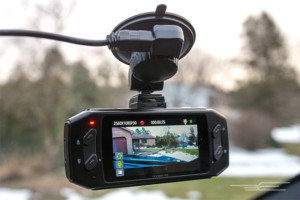Dash cams are valuable tools for protecting yourself legally, such as if you are in an accident caused by someone else, or for reviewing events such as a crash happening in front of you, or perhaps you left your car with a valet who thought it would be fun to take a joyride on your behalf.
They are designed to record video all the time that your vehicle is operating, and once the memory is full, the newest video will typically replace the oldest recording. This allows you to always have the previous few hours of video available to review. My own dash cam will store about five hours of video before it begins erasing the older clips.
Most dash cams also include the ability to record audio as well as video. The audio is recorded from a microphone that is built into the dash cam, inside the car, so any conversations taking place within the vehicle will be captured.

Automatic audio recording
The audio record feature is usually turned on by default. Some units have a button that can toggle the audio recording on or off. Our advice is to turn the mics off and leave them off. You may need to find the proper setting in the feature menus to stop the microphone from turning on automatically. Consider what could happen if you have a video clip that you desire to turn over to police or to your insurance company, you may not want your own comments, expletives, or choice curse words presented as evidence along with the video.
Eavesdropping on passengers
You should be aware that with the audio active, you may be recording the conversations of passengers in your vehicle without their knowledge or permission. That could be an eavesdropping offense in many states in the US if they require all-party consent. If you have video of a valet damaging your car while taking it for a joyride, the evidence could be declared inadmissible due to the eavesdropping aspect of recording audio.
Michigan attorney Steve Lehto recently wrote on this topic for Road & Track:
The issue arises when you are not in your car. Like when you drop off your supercar for minor warranty work and leave it in the hands of professionals for the day. If your dash cam records a conversation between people in the car that you are not a part of, it would be considered “eavesdropping” in many states. Eavesdropping statutes often carry harsh penalties: In Michigan it is a felony, carrying possible prison time and a steep fine. As an attorney, I advise you to avoid eavesdropping.
There are a couple of points to be made here, however. The obvious one is that all of these statutes tend to address “conversation.” As in, people talking. If the dash cam is only recording video but no audio, you would be fine. Does the camera have a mute function? If so, mute it when you will not be in the car.
If you didn’t mute the recording and got some juicy footage–including audio–of your car being thrashed, you might still have some decent defenses. The obvious one is that the camera is in plain sight. Did the miscreants really not know what the dash cam was doing while they were beating on your car? If the recording was not secret, then it might not be considered eavesdropping.
Sensitive microphones
Dash cam mics can do a good job picking up the audio in your car. Here is a rather exciting dash cam clip of a 2016 accident on the Tappan Zee Bridge near my home in Tarrytown, NY. The audio you hear is from the car radio that the driver was listening to. Surprisingly, the driver seemed to stay calm. If it was me, there might be a bit more vocal expression.
Recordings could be accessed by others
When we are asked to inspect a vehicle for eavesdropping or tracking devices during a TSCM sweep, we also take note if the client uses a dash cam. They may have been eavesdropping on themselves. If the bad guy could get inside the vehicle they could either grab the memory card or just download directly with a USB cable. Some dash cams are also available with wifi connections, so there would not even be a need to access the inside of the vehicle to retrieve the video clips.
Reasons for a dash cam
Protection from legal issues and security of the vehicle are certainly good reasons to have a dash cam. Other considerations include documenting a trip or recording driving routes, such as for security advance work. In such situations the microphone might be useful for adding your own comments, I would recommend turning the mic on just for those events and be sure it is off at other times.
Reviews
If you are considering purchasing one for your vehicle, there are many variables in quality, features, and price to consider. I recommend checking out the reviews done by Mat at Techmoan.com. He has very thorough reviews of many models with different features, sizes, and shapes on his website and YouTube channel. Based on Mat’s comments I opted for the VanTrue R2 with built in monitor screen and removable memory card.
If you have a dash cam or plan to install one, though, learn how to turn the microphone off, and drive safe.
